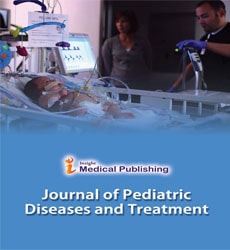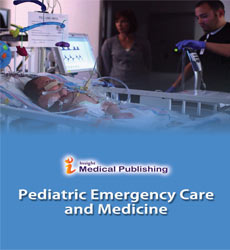Disorders of Pediatric Mental Illness
Meghu Lokesh
Meghu Lokesh*
Department of Pharmacy, Jawaharlal Nehru Technological University, Hyderabad, Telangana, India
- *Corresponding Author:
- Meghu Lokesh
Department of Pharmacy
Jawaharlal Nehru Technological University
Hyderabad, Telangana, India
E-mail: Meghu.L015@gmail.com
Received Date: November 20, 2021; Accepted Date: November 25, 2021; Published Date: November 30, 2021
Citation: Lokesh M (2021) Disorders of Pediatric Mental Illness. Pediatr Emerg Care Med Open Access. Vol.6 No.6:29.
Abstract
Parents may greatly benefit from training to help them to: • Be on the lookout to praise the child for accomplishments and abilities • Understand why earlier negative attitudes built up in the family due to the presence of symptoms originating from the illness
Editorial
Parents may greatly benefit from training to help them to: • Be on the lookout to praise the child for accomplishments and abilities. • Understand why earlier negative attitudes built up in the family due to the presence of symptoms originating from the illness. • Work on undoing such disruptive patterns of behavior and adopting positive patterns of interaction within the family. • Learn ways to relieve stress, possibly along with the child. • Accept counselling sessions as a family, both to understand better what the child is going through and what to expect, as well as to learn how best to help. • Learn and communicate new behavior patterns and skills from the counsellors to change earlier attitudes of frustration, disappointment and anger to healthy family interactions. • Seek professional help if the child shows any selfdestructive or violent behaviour. Parents and school • Parents need to take the initiative to work out a common plan with the child’s teachers, along with the school counsellor, to enable the child to meet academic goals. • Work with the school to manage the child’s health properly. • Communicate regularly with caregivers at school. • Teachers and other caregivers should know what to expect from the child and what to do if anything occurs for which they are not prepared. • The child’s medications should be arranged to be given regularly and on schedule, arranging with school workers when necessary. • If applicable, use special education services (in the form of an education program adapted for the child, which should be developed within a fixed period) to help the child learn better especially if there are signs of difficulty in school. • Even if special educational programs are not available, free public education appropriate to the child’s disability can be sought as the right of the child with mental disability. • Many countries have special training and information centers for parents as well as advocacy workers to ensure that parents get the right help for their children’s education once they are diagnosed with mental illness, as for instance a professional evaluation using validated tools. Neighbours The neighbours and friends of the child should know what the child’s condition is to the extent that they know about the child’s normal routine, know how to help with medications if required, and can respond properly and take the right steps if they see anything unusual, such as signs of withdrawal or sadness. Support groups Support groups are invaluable to help find new and better ways to cope with the illness in healthy ways and perhaps learn about new treatment options, by connecting with other families and parents with similar problems. If meetings are held these provide good times of sharing both successes and challenges and learning more about the condition from experts, thus encouraging parents to reach out and be part of a larger community rather than sink into depression and isolation. Parents and other caregivers should also be vigilant to take time off to recoup their own energy, and they should surround themselves with people who understand their stress. They may face the strain of not being able to work jobs as before, facing social ostracism or unthinking criticism, and chronic fatigue, especially if they are not well themselves. Encouragement to take time to look after oneself as well as one’s child is another great advantage of being part of a support group. Help can be sought from doctors, community and hospital psychiatry centres, family or social services, religious organizations, and other private facilities if possible.

Open Access Journals
- Aquaculture & Veterinary Science
- Chemistry & Chemical Sciences
- Clinical Sciences
- Engineering
- General Science
- Genetics & Molecular Biology
- Health Care & Nursing
- Immunology & Microbiology
- Materials Science
- Mathematics & Physics
- Medical Sciences
- Neurology & Psychiatry
- Oncology & Cancer Science
- Pharmaceutical Sciences
